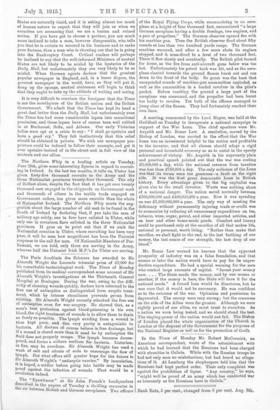A meeting, summoned by the Lord Mayor, was held at
the Guildhall on Tuesday to inaugurate a national campaign in support of the War Loan. The chief speakers were Mr. Asquith and Mr. Boner Law. A resolution, moved by the Bishop of London, was carried to the effect that the War Loan was an investment helpful to the nation and profitable to the investor, and that all classes should adopt a rigid personal and household economy so as to assist in the speedy achievement of victory. Mr. Asquith in his supremely plain and practical speech pointed out that the war was costing 23,000,000 a day, while the national revenue from taxation was less than £750,000 a day. The only criticism of the Loan was that its terms were too generous—a fault on the right side. It was the first great democratic Loan in British history. Every advantage given to the big capitalist was given also to the small investor. Waste was nothing short of a national danger. The nation saved normally between £300,000,000 and £400,000,000 a year. Now it was spending on war £1,000,000,000 a year. The only way of meeting the deficiency without permanently injuring trade or credit was to economize by reducing all unnecessary expenditure on tea, tobacco, wine, sugar, petrol, and other imported articles, and on beer and other home-made goods. Comfort and luxury could be purchased only at the sacrifice of all that makes life, national or personal, worth living. "Rather than make that sacrifice, we shall fight to the end, to the last farthing of our money, the last ounce of our strength, the last drop of our blood."










































 Previous page
Previous page